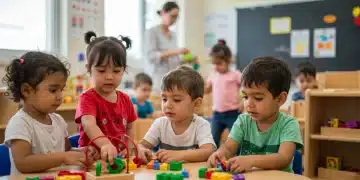Stuff learning disability support: find the right help

Stuff learning disability support involves collaboration between families, schools, and community resources to help children with learning disabilities thrive academically and socially through tailored interventions and effective strategies.
Stuff learning disability support is essential for parents navigating the challenges of helping their children thrive. Have you ever wondered what resources are available to support your child’s unique needs? In this article, we’ll explore various options that can make a difference in your child’s journey.
Understanding learning disabilities
Understanding learning disabilities is essential for parents and educators alike. These disabilities can affect how a person learns, processes information, and interacts with the world around them. By recognizing the signs and characteristics, we can better support those who need it.
Many children with learning disabilities may struggle in traditional classroom settings. They often face challenges in reading, writing, or math, which can impact their overall performance. To help these children succeed, it is crucial to understand their unique needs.
Common Types of Learning Disabilities
There are several types of learning disabilities that can affect a child’s education. Here are some of the most common:
- Dyslexia: Affects reading and language processing.
- Dysgraphia: Impacts writing and fine motor skills.
- Dyscalculia: Challenges with numbers and math concepts.
- Auditory Processing Disorder: Difficulty processing sounds and verbal instructions.
It’s important to remember that each child experiences their learning disability differently. Some may struggle with attention, while others might find it hard to stay organized. Identifying these challenges early can lead to effective support strategies.
Supporting a child with a learning disability often involves collaboration between parents, teachers, and specialists. Open communication is key. Discussing a child’s specific challenges can help everyone involved find the best ways to assist the student.
Signs to Look For
Recognizing the signs of learning disabilities can lead to earlier intervention. Some common signs include:
- Struggling with reading comprehension
- Difficulty remembering sequences
- Poor handwriting or trouble organizing thoughts
- Frustration with math tasks
If these signs are noticed, it’s essential to consult with educators or specialists who can provide guidance on next steps. Early diagnosis and intervention can significantly impact a child’s educational journey, helping them leverage their strengths while addressing their challenges.
Identifying the right support services
Identifying the right support services for children with learning disabilities is vital to their success. There are many resources available, and knowing where to turn can make a big difference. Each child is unique, so finding tailored support is essential.
Several types of support services can be considered. Schools often have special education resources and teams that can assess students’ needs. Parents should reach out to educators who can guide them in the process.
Types of Support Services
When looking for the right support, consider these essential services:
- Special Education Programs: Designed to meet the unique needs of students with disabilities.
- Speech and Language Therapy: Helps children who have difficulties with communication.
- Counseling Services: Provides emotional and psychological support for children facing challenges.
- Tutoring Services: Personalized attention in subject areas where students struggle.
It’s also important to involve parents in these discussions. Parents can share their observations and insights, which can provide valuable information to educators and specialists. Collaborating can lead to solutions that work best for the child.
Many families have found benefit in community resources as well. Local organizations can provide additional support, training, and guidance. Finding a support group can help parents connect with others who share similar experiences, creating a network of understanding and advice.
Seeking Professional Evaluation
To ensure a child receives appropriate support, professionals may suggest evaluations. These can include psychological assessments, learning assessments, and general health evaluations. These insights can lead to tailored interventions that fit the child’s specific needs.
Ultimately, identifying the right support services requires patience and persistence. Each step taken can lead to better outcomes for children with learning disabilities, allowing them to thrive both academically and socially.
How schools can assist families

How schools can assist families of children with learning disabilities is an important consideration in creating a supportive educational environment. Schools play a significant role in ensuring that children receive the necessary help. Collaboration between parents and educators is essential.
Schools often have dedicated staff such as special education teachers and counselors who understand how to support students with learning challenges. These professionals can work closely with families to develop individualized education plans (IEPs), which outline specific strategies and accommodations tailored to the student’s needs.
Collaboration is Key
Open communication between teachers and families fosters a better understanding of the child’s needs. Regular meetings and discussions can help identify effective strategies to assist the child. Here are a few ways schools can do this:
- Regular Assessments: Conduct assessments to monitor progress and adjust interventions as necessary.
- Parent Workshops: Offer workshops to educate parents about learning disabilities and available resources.
- Resource Availability: Provide access to materials and tools that support learning at home.
- Support Groups: Facilitate support groups for families to share experiences and resources.
Additionally, schools can help families navigate the various services available. This includes connecting them with external resources, like community organizations that provide further support. By working together, schools can ensure that families are not managing these challenges alone.
Involving families in the educational process is crucial. Schools may also offer training sessions that empower parents with strategies to help their children at home. When parents understand how to reinforce learning, it can significantly enhance the child’s overall success.
Communication and Transparency
Effective communication is fundamental. Schools should ensure that families are kept informed about their child’s progress and any challenges that arise. Being transparent about what is working and what isn’t allows for better collaboration to find solutions that work.
Ultimately, schools have the responsibility to support families through education and resources. By creating a welcoming and proactive environment, they help children with learning disabilities thrive academically and socially.
Effective strategies for at-home support
Effective strategies for at-home support can play a crucial role in helping children with learning disabilities thrive. Parents can implement various techniques to create a positive and productive learning environment at home.
Establishing a structured routine is one of the most impactful strategies. A consistent schedule helps children feel secure and understand what is expected of them. This can include designated times for homework, study, and relaxation.
Creating a Positive Learning Environment
An inviting and organized space can significantly enhance a child’s focus. Here are some tips for setting up an effective learning area:
- Minimize Distractions: Select a quiet spot free from interruptions like television or noisy siblings.
- Organize Materials: Keep necessary supplies such as pencils, paper, and books within easy reach.
- Use Clear Guidelines: Establish rules about how and when to do homework.
- Incorporate Breaks: Allow time for short breaks to rest and recharge.
In addition, positive reinforcement can motivate children. Celebrate their successes, no matter how small, to encourage continued effort. Use praise or rewards to acknowledge their hard work. This builds confidence and promotes a love for learning.
Another effective strategy is to engage with their learning directly. Ask questions about what they are learning, and encourage discussions about their interests. This involvement not only reinforces lessons but also shows children that their education is valued.
Incorporating Learning into Daily Life
Integrating educational activities into daily routines can make learning less daunting. For example, cooking together can reinforce math skills through measuring ingredients. Reading aloud together can enhance language skills while enjoying quality time.
Lastly, being patient and understanding is vital. Learning disabilities can lead to frustration for both the child and the parent. Encouraging a positive mindset and addressing challenges calmly can transform setbacks into learning opportunities.
Connecting with community resources
Connecting with community resources is essential for families of children with learning disabilities. Community resources offer support, information, and opportunities that can greatly impact a child’s educational journey. Understanding what is available can empower parents and caregivers.
Many local organizations provide specialized services designed to assist families. These resources may include tutoring programs, counseling services, and advocacy groups. By engaging with these organizations, families can access tools that help their children succeed.
Types of Community Resources
Here are some valuable resources that families should consider:
- Tutoring Centers: These centers often offer personalized instruction tailored to different learning styles and needs.
- Support Groups: Connecting with other parents facing similar challenges can provide emotional support and shared experiences.
- Behavioral Health Services: Mental health professionals can assist children in dealing with the emotional aspects of learning disabilities.
- Local Workshops: Many community organizations offer workshops to educate parents on learning disabilities and effective support strategies.
Finding these resources can be done through online searches, school referrals, or by contacting local non-profit organizations. Parents should actively seek out information and be aware of the available options.
In addition to formal resources, community events can also provide valuable support. Participating in workshops, seminars, or events focused on learning disabilities can increase awareness and understanding. These gatherings create opportunities for networking and exchanging ideas.
Building Relationships with Local Experts
Establishing relationships with local experts, such as special education teachers and therapists, can enhance access to resources. These professionals can offer guidance based on their experience and knowledge. Many schools also have family outreach coordinators who can help connect families with the right services.
Ultimately, being proactive in seeking out community resources equips families to better support their children with learning disabilities. The more connections made, the more tools available to ensure success both in the classroom and at home.
FAQ – Common Questions about Learning Disability Support
What are common types of learning disabilities?
Common types include dyslexia, dysgraphia, dyscalculia, and auditory processing disorder.
How can schools support families of children with learning disabilities?
Schools can provide special education resources, regular assessments, and parent workshops to help families navigate their child’s needs.
What strategies can parents use at home to support their child?
Establishing a routine, creating a positive learning environment, and using positive reinforcement can significantly help.
How can I find community resources for learning disabilities?
You can search online, consult with schools, or contact local organizations that specialize in support for learning disabilities.





